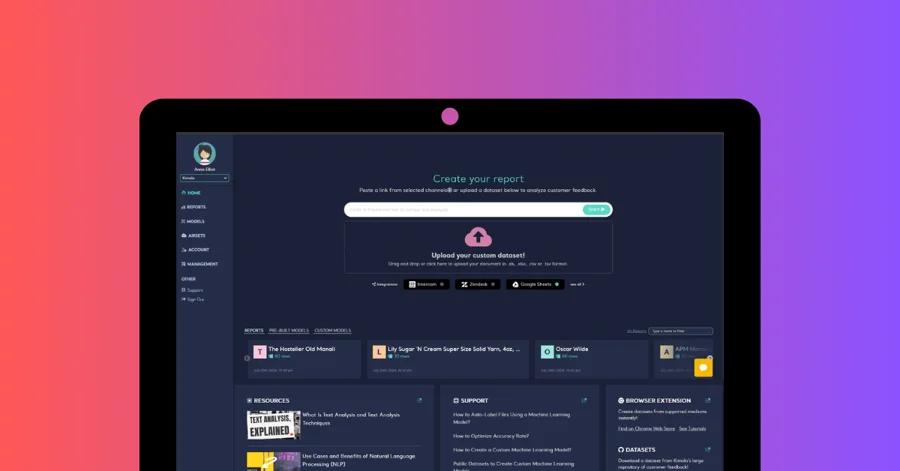Complete Market Research Guide for Car Rental Company
Feb 27, 2026 - 20 minute read
Introduction
Welcome to our comprehensive guide on market research for car rental companies! Whether you're running an established business or starting fresh in the car rental industry, gaining insights to stay ahead of the curve is crucial. But before we dive into the technicalities, let's take a moment to appreciate how essential car rentals have become in our daily lives. 🚗✨
Imagine planning a family vacation, embarking on a business trip, or even indulging in a spontaneous weekend getaway. One thing that always enhances these experiences is the convenience of having a car at your disposal. Car rentals offer the freedom and flexibility to explore new places, navigate through unfamiliar cities, and streamline logistics for various events. They fulfill our fundamental need for mobility and convenience in today's fast-paced world. 🌍
Moreover, just as a GPS guides you through an unfamiliar city, market research serves as the navigational tool for your business journey. It involves gathering, analyzing, and interpreting valuable information about your market, customers, competitors, and industry trends. Without market research, making informed decisions becomes a guessing game, akin to wandering through a new city without a map. 🗺️
In the car rental industry, market research is even more crucial due to its highly competitive nature and constantly evolving consumer preferences influenced by technological advancements, travel trends, and economic shifts. Engaging in market research allows car rental companies to identify what their customers truly want, understand how to differentiate themselves from the competition, develop services that meet market demands, create targeted marketing strategies, and adapt quickly to changing market conditions.
In this guide, we'll explore the ins and outs of understanding the car rental market, discuss the limitations of traditional research methods, and illustrate how leveraging public customer feedback can be a game-changer. Additionally, we'll showcase how Kimola's cutting-edge technology can help car rental companies transform abundant customer feedback into actionable market research reports. So, buckle up and prepare for an enlightening journey into the world of market research for car rental companies! 🚀
- Understanding the Car Rental Market
The car rental industry has come a long way from its humble beginnings. Starting in the early 20th century, when renting a car was an exotic novelty, it has evolved into a global powerhouse integral to the transportation and travel sectors. Originally catering to business travelers and affluent customers, the industry has democratized over the decades, making car rentals accessible to a broader spectrum of people. Today, the market is multifaceted and dynamic, with online booking platforms, integrated mobile apps, and global networks making car rentals easier than ever. Giants like Hertz, Enterprise, and Avis dominate the landscape, but there's plenty of room for smaller players to carve out their niches. 🌟
Key trends are continually shaping the current market landscape. Technological integration has transformed how consumers interact with car rental companies by allowing them to reserve, pay, and obtain customer service through digital platforms. Sustainability initiatives are also gaining traction, driven by growing environmental awareness and increasing demand for eco-friendly vehicles. As a result, companies are gradually expanding their fleets to include electric and hybrid cars. Furthermore, flexible mobility solutions like car-sharing and subscription services offer customers cost-effective alternatives to traditional rentals. Lastly, efforts to enhance the customer experience, such as contactless rentals and personalized loyalty programs, are continuously being developed to increase satisfaction and retention. 🌍🔋
Effective market segmentation is essential for understanding and addressing the diverse needs of different customer groups within the car rental industry. Leisure travelers, for instance, typically rent vehicles for vacations, weekend getaways, and personal travel. Their priorities include affordability, ease of booking, and access to tourist-friendly cars. 🏖️ In contrast, business travelers value reliability, high-quality service, and convenience, often requiring premium vehicles, flexible pick-up/drop-off options, and amenities like GPS and Wi-Fi. 🏢
Locals and tourists also form distinct market segments. Local customers might rent cars for various reasons, such as special occasions, temporary replacements for their own vehicles, or specific needs like moving homes. Tourists, on the other hand, look for easy access to rental services at airports, hotels, and major tourist hubs, often appreciating bundled services like travel insurance and local guides. Another segmentation involves the duration of rentals. Short-term rentals, typically ranging from a few hours to a few days, are popular among business travelers, day-trippers, and those needing a car for a brief period. Long-term rentals are preferred by individuals on extended vacations, temporary work assignments, or those considering a lease alternative without long-term commitment.
Identifying and targeting the right market segments enable car rental companies to tailor their services and marketing strategies effectively. For example, offering specialized packages for business travelers or creating promotions targeted at tourists can significantly enhance customer satisfaction and loyalty, ultimately driving business growth. By understanding these market segments and evolving trends, car rental companies can optimize their operations, offer more personalized solutions, and stay competitive in an ever-changing industry. This foundational knowledge sets the stage for more in-depth research and strategic decision-making as we progress further in this guide. 📊🌐
- Why Conventional Research Methods May Not Be Enough
While traditional market research methods like quantitative research (surveys and statistical analysis) and qualitative research (focus groups and in-depth interviews) have long been the cornerstone of understanding customer behaviors and market trends, they are not without significant limitations, especially in today's fast-paced business landscape. 🕰️💼
One major drawback of conventional market research methods is their costliness and time-consuming nature. Conducting large-scale surveys and organizing focus groups can be expensive and logistically challenging, requiring substantial financial and human resources. On top of that, these methods often take a significant amount of time to design, execute, and analyze, resulting in delays that can make the insights less relevant by the time they reach decision-makers.
Another limitation is the difficulty in capturing real-time customer sentiments. Traditional methods often provide a snapshot of the market at a specific point in time, which may not accurately reflect ongoing changes and emerging trends. For example, a customer’s experience with a rental car might be shared through a survey weeks or months after the actual experience, which can dilute the immediacy and emotional impact of their feedback.
In contrast, leveraging real-time customer feedback offers a myriad of advantages. Understanding evolving customer expectations is crucial for staying competitive, and real-time feedback provides the most accurate and timely insights into what your customers currently think and feel. This immediacy is invaluable, as it allows businesses to respond swiftly to issues, gauge the success of new initiatives, and keep up with emerging trends.
Real-time feedback, collected through various channels like online reviews and social media comments, provides a continuous flow of fresh information. This dynamic nature allows companies to monitor customer sentiments almost instantaneously and make more informed decisions to enhance services or address concerns. By considering real-time feedback, car rental companies can maintain a more agile approach, ensuring they meet customer expectations and adapt to market shifts promptly. 🔍💬
By addressing the limitations of traditional market research methods and utilizing real-time customer feedback, car rental companies can gain a more comprehensive and current understanding of their market. This modern approach not only saves time and resources but also ensures that the insights gathered are relevant and actionable, driving better business outcomes in an ever-evolving industry. 🚀📈
- Choosing the Right Locations
Choosing the optimal locations for your car rental business is essential, as it greatly influences visibility, accessibility, and customer convenience, ultimately impacting your success. Investing in thorough location analysis ensures you identify prime spots that align with your business goals and customer needs. 🌍📍
Several factors should guide your decision-making process. Understanding the demographics of potential locations is crucial. Areas with demographics that match your target customers, such as business districts for business travelers and residential areas or tourist hubs for leisure travelers, are ideal. Tourist hotspots significantly impact demand, making high-footfall areas like airports, major train stations, hotels, and popular attractions highly attractive for car rental businesses. 🏨✈️
Business hubs offer a consistent demand from business travelers. Look for locations near convention centers, corporate parks, and financial districts, and ensure your services, such as premium vehicles and flexible rental options, cater specifically to this demographic. Additionally, evaluate competitor presence and market saturation levels to identify underserved areas where demand outstrips supply, avoiding overly competitive regions and pinpointing new growth opportunities.
Accessibility is another crucial factor. Consider the transport infrastructure of potential locations, including proximity to highways, public transportation, and ease of access for local customers. Good connectivity ensures customer convenience for picking up and dropping off rental vehicles, which can significantly enhance customer satisfaction. 🚗🚦
To enhance the accuracy and efficiency of your location analysis, employ advanced tools and techniques. Geographic Information Systems (GIS) tools allow you to visualize and analyze spatial data, helping assess population density, traffic patterns, and proximity to key points of interest. Foot traffic analysis, using location-based services and mobile analytics, helps understand pedestrian flow, enabling the selection of high-visibility locations. Accessing demographic data from government sources and commercial databases provides detailed information on population characteristics, aligning your services with local demographics.
Mapping competitor locations using analysis tools helps understand their market presence, identifying gaps or opportunities. Conducting primary research through surveys and observational studies can gather first-hand data on customer preferences, competitor strengths and weaknesses, and local business conditions, providing deeper qualitative insights.
By carefully analyzing these factors and employing advanced techniques, car rental companies can make informed decisions that enhance visibility, accessibility, and overall business performance. Learning from successful strategies illustrates the significant impact of strategic location selection in achieving business success.
- Leveraging Public Customer Feedback for Market Research
In an era where customer opinions are instantly accessible, leveraging public customer feedback has become transformative for market research. This method offers real-time, authentic insights that traditional approaches often miss, making it a game-changer for car rental companies.
The treasure trove of public customer feedback is mainly found in online review platforms such as Google Business, Trustpilot, the Google Play Store, and the App Store. These platforms play a crucial role in shaping consumer trust and business reputation. A robust Google Business profile, filled with positive reviews, can significantly enhance a car rental company's local SEO and visibility. Trustpilot, known for its credibility, provides detailed reviews that potential customers consider before making decisions. Similarly, feedback on the Google Play Store and App Store offers invaluable insights, especially for companies with a digital presence, highlighting what users appreciate or dislike about their mobile apps. Positive reviews build credibility, while negative reviews, if handled well, offer opportunities for improvement and demonstrate a commitment to customer service.
One of the most compelling advantages of leveraging public customer feedback is the ability to aggregate data from multiple sources, providing a comprehensive view of customer sentiments. Collecting feedback from various platforms helps paint a holistic picture of customer opinions, revealing trends and common themes that might otherwise go unnoticed. Aggregated feedback data offers several benefits. Analyzing diverse feedback types—such as sentiment analysis, written comments, and recurring themes—provides a richer, multifaceted understanding of customer views. Sentiment analysis offer a quick summary of overall satisfaction, while written comments provide context, explaining the reasons behind those ratings. Common themes, identified through text analysis, can highlight areas needing improvement or reveal the factors driving customer satisfaction.
For example, if multiple reviews mention long waiting times for vehicle pick-up, this signals a critical area for operational improvement. Conversely, consistent praise for the cleanliness and condition of rental cars can be leveraged in marketing efforts to highlight strengths and attract new customers. By tapping into aggregated feedback data, car rental companies can quickly and efficiently identify both pain points and strengths. This enables them to make informed decisions, tailor services to meet customer expectations, and cultivate a loyal customer base. In a competitive industry, real-time, actionable insights can be the key to standing out and thriving.
- Kimola: Transforming Customer Feedback into Market Research
Navigating the ever-evolving landscape of customer feedback can be daunting, but that's where Kimola steps in to simplify the process. Kimola offers a groundbreaking solution that transforms customer feedback into actionable market research, empowering car rental businesses to stay ahead of the curve. By leveraging advanced AI, machine learning algorithms and Natural Language Processing (NLP), Kimola converts vast amounts of customer feedback into comprehensive market research reports. This technology provides deep, actionable insights that drive business success, making it easier for car rental companies to tap into the wealth of information available on public review platforms. 🤖📊
For car rental companies, this means no longer having to manually sift through countless reviews or rely solely on traditional market research methods. Kimola's technology streamlines this process, saving time and resources while ensuring that businesses have access to the most relevant and real-time data. The magic behind Kimola’s technology starts with its step-by-step process of data scraping, AI analysis, and report generation.
The first step, data scraping, involves collecting customer reviews from multiple public review platforms such as Google Business, Trustpilot, the Google Play Store, and the App Store. This creates a comprehensive dataset that captures a wide range of customer opinions. Once the data is collected, Kimola’s AI algorithms analyze the feedback to identify patterns, sentiments, and recurring themes. Unlike manual analysis, AI can process large volumes of data quickly and with high accuracy, ensuring that no critical insight is overlooked.
To make this accessible to car rental businesses of all sizes, Kimola offers two distinct solutions:
Kimola.com: Ideal for quick and one-time analyses, Kimola.com allows you to paste the Trustpilot, Google Business profile links of your own car rental company, competitor companies, or the App Store or Play Store application links. Kimola's dynamic classification technology then understands the context and creates clusters with relevant tag names without the need for any training. This means you can quickly obtain actionable insights tailored to your specific needs.
Kimola Cognitive: For more advanced analyses, Kimola Cognitive provides a deeper and more detailed analysis output. Customer feedback is often nuanced and multifaceted, and Kimola Cognitive addresses this with multi-label classification, meaning each feedback item can be associated with multiple tags, thus capturing a more accurate picture of customer sentiments. Additionally, it offers aspect-based sentiment analysis, providing insights not just into the general sentiment but also into specific aspects of your services or products.

After classifying customer feedback, Kimola makes it easy to extract valuable insights, such as executive summaries, frequently asked questions, and lists of the most liked features of your products—all prepared based on customer feedback. You can also understand what personas, created with AI based on your customer feedback, say about your company and services along with specific sentiment rates.
Executive summaries created for each classified tag can be directly added to your presentations, making it easier to communicate insights to stakeholders. Standard performance metrics are readily available in the interface, and you can also create pivot tables and comparisons directly within Kimola’s platform. Pivot tables allow you to include other columns in your data and make comparisons, providing a more comprehensive view of your feedback analysis.
Once your analyses are complete, Kimola offers multiple export options, allowing you to print your findings in PPT, Excel, and PDF formats for easy sharing and reporting. By harnessing the power of Kimola.com and Kimola Cognitive, car rental companies can transform raw customer feedback into actionable insights, driving better business decisions and staying competitive in the industry.
- Applying Market Research Insights to Enhance Your Car Rental Business
Leveraging Kimola’s advanced market research capabilities is just the beginning; the true value comes from how you implement these insights into your business strategy. Let's explore practical steps to integrate Kimola's analyses and drive data-driven decisions that propel your car rental business ahead of the competition.
First and foremost, enhancing the customer experience is critical. By using Kimola’s detailed analysis, you can pinpoint recurring issues like long wait times, vehicle availability, or cleanliness. Addressing these pain points directly can significantly boost customer satisfaction and loyalty. Segmenting customer feedback helps you understand the unique needs of leisure travelers, business customers, and local renters, allowing you to develop tailored services or packages efficiently. Additionally, by analyzing communication-related feedback, you can improve interactions with customers, from upgrading IVR systems to streamlining booking processes and enhancing customer service training.
On the marketing front, Kimola’s insights enable you to develop more targeted and effective campaigns. Leverage the strengths highlighted in customer feedback for your marketing and promotional activities. If customers frequently praise your easy booking system or vehicle quality, these aspects should be prominently featured in your advertisements. Transparency is also crucial; openly addressing and rectifying concerns builds trust, and Kimola’s sentiment analysis can help you do this effectively. Utilizing feedback data to personalize outreach—through tailored emails, loyalty programs, and targeted ads—can enhance engagement and conversion rates.
Optimizing fleet management is another area where Kimola’s insights prove invaluable. Analyze which vehicle types are most favored by different customer segments, whether it’s electric cars for eco-conscious consumers or luxury vehicles for business travelers. Aligning your fleet with customer preferences maximizes satisfaction and utilization rates. Furthermore, by identifying trends related to vehicle maintenance, you can proactively address common issues, reducing breakdowns and complaints, and set your service apart by upgrading your fleet based on customer desires.
Enhancing competitive positioning requires a deep understanding of your competitors, and Kimola’s comparison features facilitate this. By comparing customer feedback from your company with that of your competitors, you can identify strengths and weaknesses relative to the market. Use this data to benchmark performance and set improvement targets. Highlight your unique selling propositions (USPs) in branding and customer communications, whether they are free add-ons, superior customer service, or a diverse vehicle fleet. Innovation is key; address unmet needs revealed through feedback analysis by introducing new service features, offering more flexible rental options, or enhancing digital experiences.
Finally, driving continuous improvement is essential for maintaining a competitive edge. Regularly monitor feedback analysis to stay updated with changing customer sentiments and market trends, ensuring your strategies evolve with the latest insights. Establish structured feedback loops, using findings to inform strategic decisions and operational adjustments, and then monitor the impact of these changes. Regularly train your staff based on feedback insights to enhance customer service skills or improve operational efficiency. Well-informed and trained employees are crucial to implementing positive changes.
By incorporating Kimola’s data-driven insights into your business strategies, you can make informed, effective decisions that enhance customer satisfaction, optimize operations, and position your car rental company for sustained success.
- Future Trends in Market Research for the Car Rental Industry
As the car rental industry evolves, so does the landscape of market research. Emerging technologies and shifting customer dynamics are redefining how businesses gather and utilize information, paving the way for a more data-driven and responsive future. One of the most transformative trends is the role of AI, machine learning, and big data. These technologies can revolutionize the way car rental companies collect and analyze customer feedback. AI and machine learning algorithms can process vast amounts of data with unprecedented speed and accuracy, identifying patterns and trends invisible to traditional methods. This enables businesses to gain deeper insights into customer behaviors and preferences. Predictive analytics, leveraging big data, allows car rental companies to forecast market trends and customer needs with high accuracy. For example, predictive models can analyze historical rental data, customer reviews, and external factors such as travel trends and economic indicators to predict future demand for specific vehicle types or services. This capability allows companies to make proactive decisions, from fleet management to marketing strategies, ensuring they remain one step ahead of the competition.
Moreover, the role of customer feedback is undergoing a significant transformation with the rise of real-time, interactive feedback mechanisms like chatbots and social media platforms. These tools provide immediate, actionable insights, enabling businesses to address issues and capitalize on positive feedback swiftly. Chatbots, for instance, can collect instant feedback from customers during or immediately after their rental experience, helping businesses quickly identify and resolve any concerns. Integrating new feedback channels extends beyond traditional review platforms, with businesses now tapping into social media, in-app feedback, and even voice-activated assistants to gather customer opinions. This expansion broadens the scope of market research, offering a more comprehensive understanding of customer sentiments. Monitoring social media discussions, for example, can reveal opinions and trends that may not surface in formal reviews.
Expanding the scope of market research through these innovative channels not only enriches the data pool but also keeps companies attuned to emerging customer needs and industry trends. By embracing these future trends, car rental companies can enhance their ability to navigate an increasingly complex and competitive market landscape. In summary, the future of market research in the car rental industry lies in harnessing advanced technologies and diversifying feedback channels. AI, machine learning, and predictive analytics will enable deeper insights and more accurate forecasts, while real-time, interactive feedback mechanisms will ensure businesses can respond swiftly to customer needs. By staying ahead of these trends, car rental companies can continue to innovate, improve customer satisfaction, and drive sustained growth.
Conclusion
Navigating the competitive car rental industry requires more than just excellent customer service and a reliable fleet; it demands keen insights derived from effective market research. Through this comprehensive guide, we've explored the essentials of market research for car rental companies, highlighting the importance of understanding market dynamics, the limitations of traditional research methods, and the transformative power of leveraging real-time customer feedback.
Kimola emerges as an indispensable ally in this journey, offering sophisticated AI-driven solutions that turn abundant customer feedback into actionable market research. Whether you opt for Kimola.com for quick, on-the-spot analyses, or Kimola Cognitive for more detailed, multi-faceted insights, these platforms provide the data necessary to make well-informed, strategic decisions that can elevate your business.
By harnessing Kimola's insights, car rental companies can dramatically enhance their customer experience, craft targeted marketing campaigns, optimize fleet management, and refine their competitive positioning. These actionable insights allow for a more agile and responsive business strategy, ensuring that you can swiftly adapt to evolving market trends and customer preferences.
However, the journey doesn't stop at implementation. Continuous improvement, driven by regular monitoring of customer feedback and adapting to emerging trends, is key to maintaining a competitive edge. Embracing advanced technologies like AI, machine learning, and predictive analytics will not only deepen your understanding of customer behaviors but also enable more accurate demand forecasting and proactive decision-making.
The future of market research in the car rental industry lies in integrating these innovative tools and expanding the channels through which feedback is gathered. Interactive, real-time mechanisms such as chatbots and social media insights will play an increasingly critical role in providing immediate, actionable data that can be swiftly acted upon.
In summation, the car rental companies that leverage advanced market research tools like Kimola stand to gain a significant advantage. By prioritizing customer-centric strategies, staying technologically adept, and committing to continuous improvement, you’ll be well-equipped to not only meet but exceed customer expectations, ensuring sustained growth and a robust market presence in the ever-evolving car rental landscape. The road ahead is challenging but filled with opportunities for those who navigate it with the right insights and tools. 🚀🌍
If you would like to view a sample report, click here.








